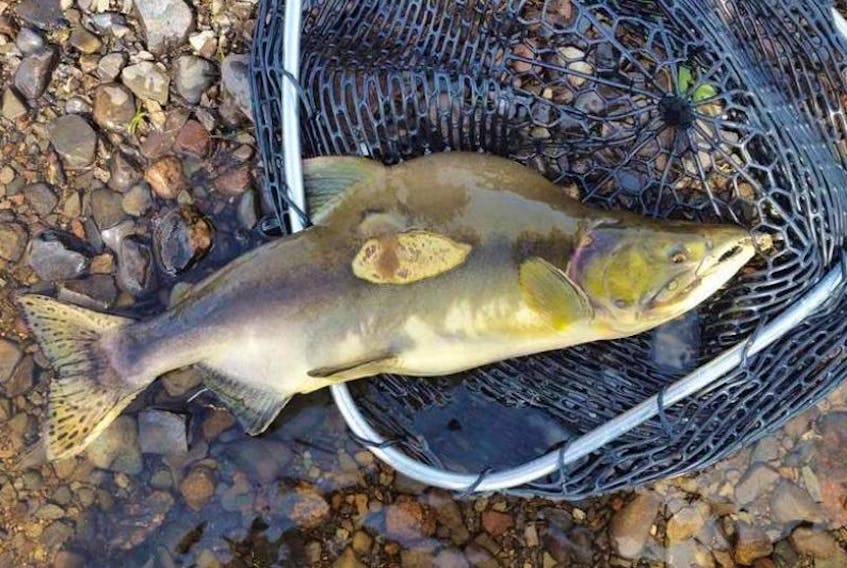I read with interest the purported observation of pink salmon in the Gander River. Sightings of Pacific salmon species are not uncommon on the Atlantic coast of North America, given they were introduced to the east coast over the past 150 years by avid angling groups, to make up for lost recreational fisheries in many areas.
We now have “naturalized” populations of pinks from Maine through to the Great Lakes — self-reproducing populations, that is.
Oh, and the reader might be interested to know we also have naturalized populations of other salmonids throughout eastern North America such as rainbow trout, German brown trout, and this includes the island of Newfoundland and Labrador.
Related story:
Genetic testing of pink salmon found in Newfoundland and Labrador rivers to take six months
In many cases these populations were introduced in the 1800s and early 1900s by angling clubs or governments of the day, to stimulate recreational fisheries. In fact, our own federal government conducted experiments to grow pink salmon at the head of the tailrace in Bay d’Espoir nearly 60 years ago (how many of those actually escaped?).
All of this to say that salmonids can, and are good at colonizing new habitat. For instance, the Atlantic salmon in the waters of North America actually originated in Europe thousands of years ago, and via the changing post glacial environment eventually colonized the rivers and streams of North America.
In this sense, Atlantic salmon are not “native” to our coast, but have adapted from their origins in Europe to the northwest Atlantic.
So, you see, what gets me is that the finding of “foreign” salmonids such as pinks (if confirmed) in N.L. waters, is not actually a new phenomenon, humans have been doing this for centuries. So, I would say this is all “déjà vu all over again” as a famous baseball pundit once said.
Why do we see some of these appearing more and more nowadays in our rivers and streams? I would argue it is a natural consequence of climate change in our oceans creating favourable conditions for colonization of new habitat by various species, including salmonid colonizers. These are but some of the predictions of climate change from the IPCC and various scientists. These predictions also include the disappearance of species from their “natural range,” and arguably for these reasons Atlantic salmon are shifting their distribution northward to Labrador on the western Atlantic and towards Norway in the eastern Atlantic.
Thus, we expect to see salmon populations to increasingly diminish over long periods of time in their southern ranges, say in Maine, N.B., N.S., and southern N.L. while they increase in the northern areas. All of this fits nicely into the climate-change predictions of variability in populations and shifts in food sources and distributional ranges of species.
Note, Atlantic salmon populations have all but disappeared from French rivers on the European continent, likely due to climate shifts, but also human encroachment on habitat over centuries.
So, you see, populations of Atlantic salmon are at risk in many jurisdictions and while self-appointed conservation groups like the Atlantic Salmon Federation (est. ca 1948) portend to be the protectors of the salmon, they really are merely avid angler groups wanting salmon in our rivers and streams to continue to hunt and fish for the “thrill of it.”
Catch and release fits nicely into this category.
Don’t get me wrong, humans have enjoyed the “thrill of the chase,” “communing with nature” aspect of angling salmonids for centuries, even millennia. In my mind, in today’s world, angling for pleasure is not really about gathering food and putting it on the table.
I don’t believe however that catch and release will accomplish the goals of conservation for Atlantic salmon in this ever changing environment. Take a look at the Atlantic Salmon Federation’s (ASF) efforts to protect wild salmon for well over 60 years. So successful that our populations of Atlantics have actually declined almost exponentially since they first became involved (no, correlation is not causation).
N.L. fish harvesters will know that the moratorium on wild Atlantics in N.L. was actually precipitated by conservation-minded groups like ASF putting pressure on Fisheries and Oceans to close the fishery.
For whom we might ask?
Yes, Atlantic salmon are under threat in much of its range in both the eastern and western Atlantic. These are expected consequences of human activities causing climate-change impacts in our oceans.
If these groups really wanted to save Atlantic salmon for future generations of N.L.ers and Canadians, they would probably start by stopping to kill thousands of mature, breeding fish every year, for pleasure in the recreational fisheries, and allow the colonizing Atlantic salmon to adapt to its new habitat. This would create much more impact I suspect on conservation of wild resources, than pointing fingers at farmers of the sea (the aquaculture folks) as the cause of declining salmon stocks. As a famous N.L.er and former fisheries minister once quipped “I didn’t take the Goddamn fish out of the sea, you did!”
Cyr Couturier
Aquaculture Scientist and Chair Aquaculture Programs
School of Fisheries Marine Institute of Memorial University









